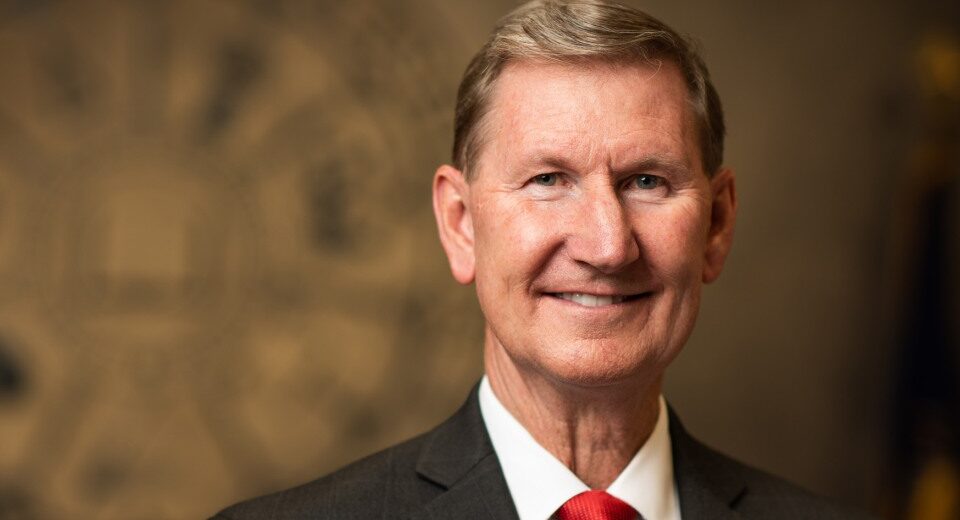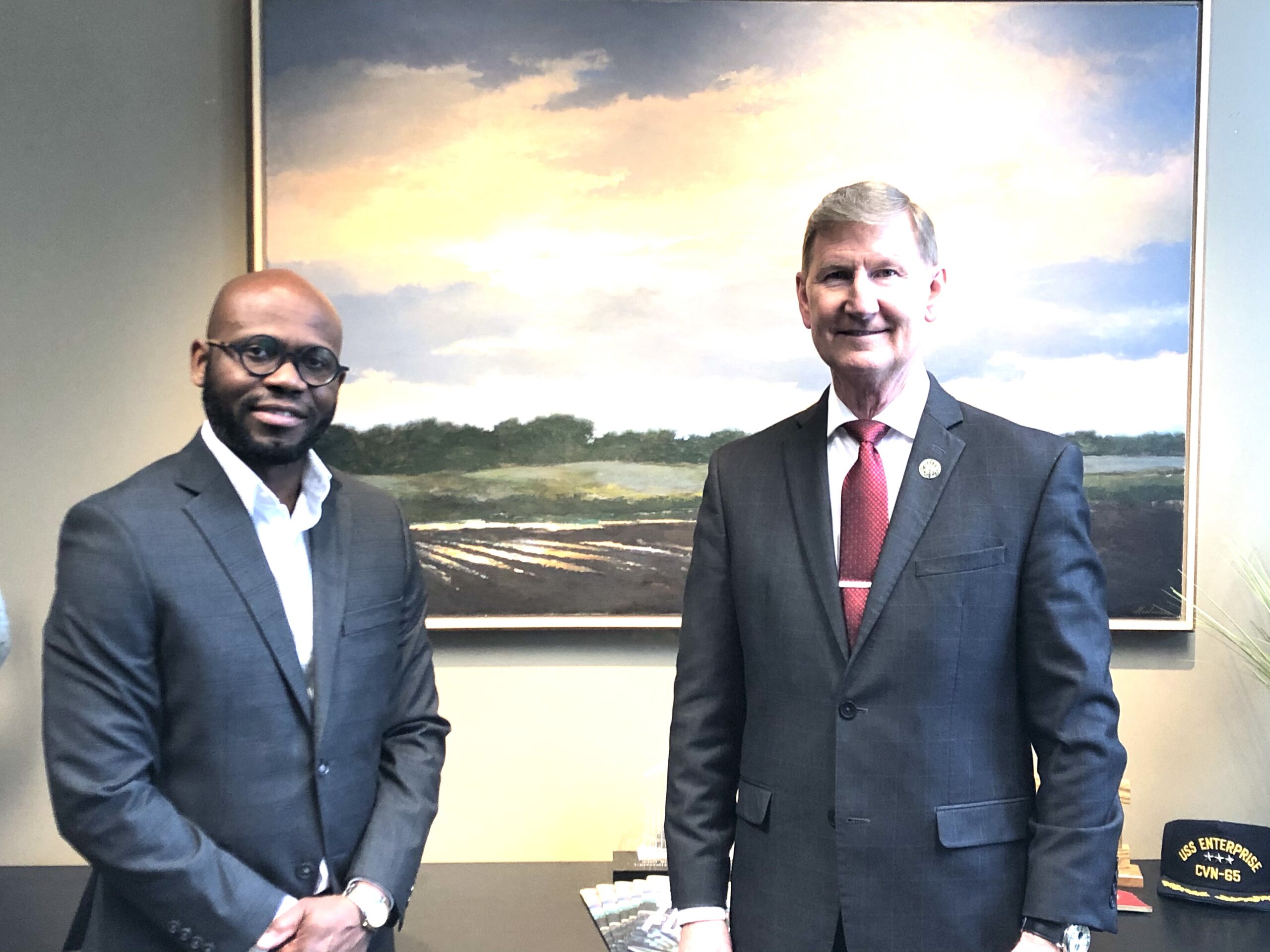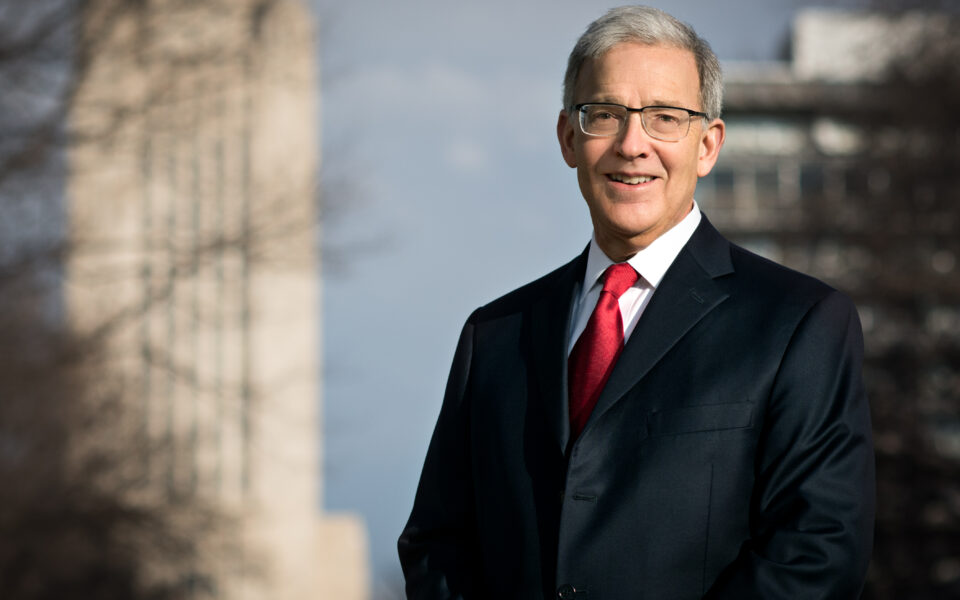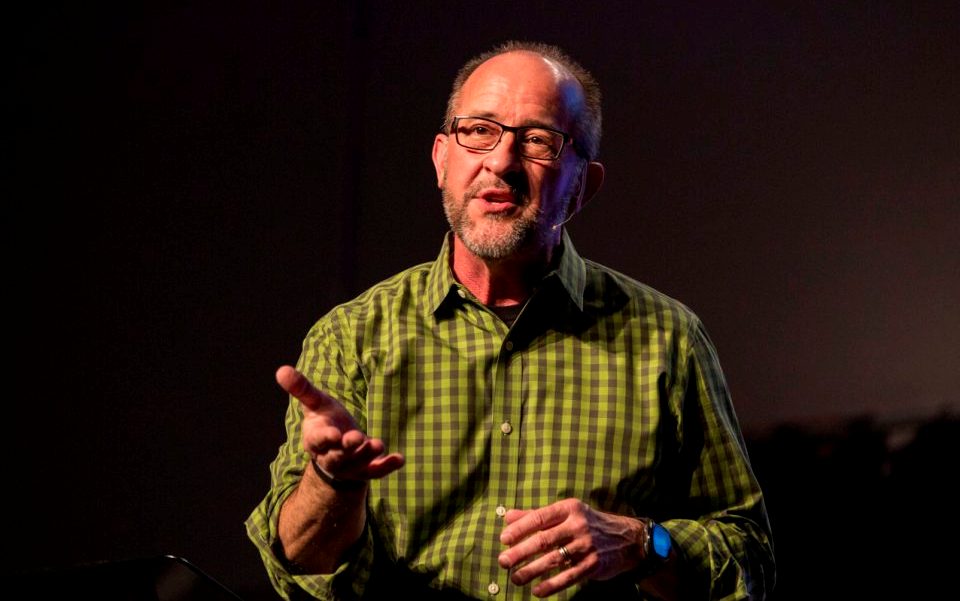University of Nebraska President Ted Carter provides positive leadership, encourages resilience and kindness

In his career with the U.S. Navy and University of Nebraska (NU) system, NU President Ted Carter has developed an extensive leadership background.
Over his 38 years as a commissioned officer with the U.S. Navy, Carter flew combat missions, trained pilots, commanded an aircraft carrier and served as superintendent of the U.S. Naval Academy, which he graduated from in 1981.
“I fell in love with aviation,” Carter says. “I just loved the exhilaration and the thrill, but also the professionalism that went with flying high-performance hyperjet aircraft.”
Strong call to serve
After retiring from the U.S. Navy in 2019, Carter became NU president in January 2020. When he and his wife moved to Lincoln, Carter says they traveled across Nebraska, visiting multiple cities and meeting thousands of people in a 15-day period.
Since becoming NU president, Carter says he continues to learn about Nebraska’s geography and people. He has also used his leadership experience to empower people by providing positive reinforcement.
“When [people] have that kind of buy-in and they are motivated to do a task,” Carter says, “you’re always going to get better results.”
How to conquer fear
COVID-19 has shown that life can be unpredictable, but Carter says people can overcome fear by building resilience.
He also says a little bit of fear is normal.
“If you’re not afraid of the great unknown or what’s coming around the corner, you’re probably not very healthy,” Carter says. “Resilience is the ability to attack the unknown and be successful in managing the fear so that it is not as much of a mystery.”
Goals for the future
At the height of the pandemic, Carter says the leadership made various changes to help Nebraska students, such as dropping the cost of online programs, freezing tuition for 2 years and instituting the Nebraska Promise, a free tuition program for any Nebraskan with a family income of $60,000 or less.
In addition to providing students opportunities for success, Carter says his goal is to promote inclusion. He urges people to show kindness rather than hostility.
“I think we just have to remind ourselves to be good to each other,” Carter says. “Be good to ourselves and be good to each other.”

About Ted Carter
Ted Carter became the eighth president of the University of Nebraska on Jan. 1, 2020, following a national search by the Board of Regents. As president, Carter leads a four-campus university system that enrolls nearly 52,000 students and employs 16,000 faculty and staff on campuses in Lincoln, Omaha and Kearney, plus academic divisions and research and extension centers across the state. He serves as chief spokesman and chief executive officer for the system, which operates on a $2.8 billion annual budget and includes a flagship Big Ten institution, a world-renowned academic health sciences center, Division I athletics programs, and preeminent institutes focused on water and agriculture, national security and defense, infectious disease and early childhood education. Carter brought with him a distinguished record in education, partnerships and military service, having come to Nebraska from the U.S. Naval Academy, his alma mater, where he served as superintendent. Under his leadership, the Naval Academy achieved a No. 1 national ranking and new records in student success and diversity. Carter previously was president of the U.S. Naval War College in Newport, R.I. A retired Vice Admiral with 38 years of service, Carter has logged more than 6,300 flying hours and holds the American record for carrier-arrested landings. In his first year at the University of Nebraska – faced with the unexpected and unprecedented challenges presented by COVID-19 – Carter has led with a focus on the land-grant priorities of access and opportunity for students and families. He launched the Nebraska Promise, a financial aid program guaranteeing free tuition for low- and middle income Nebraskans, and implemented a multi-year budget plan that included a two-year, across-the-board tuition freeze. The result was system-wide growth in enrollment, including record gains among underrepresented students. ® “I AM HUMBLED TO HAVE THE OPPORTUNITY TO SERVE AT OUR UNIVERSITY—A JOB THAT I BELIEVE IS ONE OF THE BEST IN AMERICAN HIGHER EDUCATION.” Carter oversaw the awarding of a $92 million federal contract for the university’s National Strategic Research Institute, one of only 14 University-Affiliated Research Centers in the country conducting exclusive research for the Department of Defense. During Carter’s tenure, the NU system has been ranked among the world’s top 100 institutions for earning research patents, the Omaha campus was selected as the home for a new federal counterterrorism research center, the Institute of Agriculture and Natural Resources launched a new effort focused on rural vitality, and the medical center opened an education, training and preparedness facility that positions Nebraska as the world leader in the fight against infectious disease. Carter serves as the chair of the Daugherty Water for Food Global Institute’s Board of Directors
He is a board member for the Greater Omaha Chamber of Commerce, the Nebraska Chamber of Commerce and Industry, the Naval Historical Foundation and the Naval Aviation Museum Foundation. Carter is also a member of the Aspen Institute’s Higher Education Working Group and the Association of Public and Land-Grant Universities’ Council of Presidents. He is an ex-officio member on the board of the University of Nebraska Foundation, the philanthropic partner of the university system that has a $1.7 billion endowment. Carter earned his bachelor’s degree in physics and oceanography from the U.S. Naval Academy, where he played hockey and served as team captain. He is a graduate of the Navy Fighter Weapons School (Top Gun) and holds educational credentials from the Navy Nuclear Power School, the U.S. Air Force Air War College, the Naval War College and the Armed Forces Staff College. Carter’s military career includes service for the Carrier Strike Group Twelve, in which he commanded 20 ships, two nuclear-powered aircraft carriers, and two carrier wings that were deployed to Afghanistan and the Arabian Gulf. The son of an English teacher, Carter was raised in the rural, one-high school town of Burrillville, R.I. He and his wife, Lynda, live in Lincoln and have two adult children, Brittany and Christopher.



